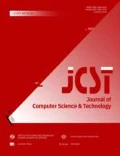Abstract
This paper presents a new soliton approach to hyper-distributed hyper-parallel self-organizing dynamic scheduling for task allocations among rational autonomous agents in a multi-agent system (MAS). This approach can overcome many drawbacks of other mechanisms currently used for coalition formation and cooperation in MAS. The thorny problems, such as overabundant bid, social behaviors, colony intelligence, variable neighbors, and interdependency, can easily be treated by using the proposed approach, whereas they are very difficult for other conventional approaches. The simulation on a distributed transport scheduling system shows the soliton approach featured by hyper-parallelism, effectiveness, openness, dynamic alignment and adaption.
Similar content being viewed by others
References
Fujita S, Lesser V R. Centralized task distribution in the presence of uncertainty and time deadline. InInt. Conf. Multi-Agent Systems (ICMAS-96), Tokyo, 1996, pp. 87–94.
Ito A, Yano H. The emergence of cooperation in a society of autonomous agents—The prisoner’s dilemma game under the disclosure of contract histories. InInt. Conf. Multi-Agent Systems (ICMAS-95), San Francisco, 1995, pp. 201–208.
Onn Shehory, Sarit Kraus. Methods for task allocation via agent coalition formation.Artificial Intelligence, 1998, (101): 165–200.
Sarit Kraus, Jonathan Wilkenfeld, Gilad Zlotkin. Multiagent negotiation under time constraints.Artificial Intelligence, 1995, (75): 297–345.
Shuai D X. Concurrent competitive wave approach to hyper-distributed hyper-parallel AI processing.Journal of Computer Science and Technology, 1997, 12(6): 543–554.
Shuai D X. Asynchronous heterogeneous mechanism for hyper-distributed hyper-parallel AI processing.Journal of Computer Science and Technology, 1999, 14(3): 234–241.
Shuai D X. Asynchronous superimposition mechanism of concurrent competitive waves for hyper-distributed hyperparallel heuristic problem solving.Journal of Computer Science and Technology, 1997, 12(4): 330–336.
Shuai D X. Synchronous-homogenous concurrent propagation mechanism of competitive waves for hyper-distributed hyper-parallel AI processing. InProc. IEEE MFI’96, Washington, U.S.A., 1996, pp. 312–319.
Shuai D X, Gu J, Deng Z D. Hyper-distributed hyper-parallel algebraic approach to MAS problem-solving. InProc. 13th Int. Conference on Parallel and Distributed Computing Systems (PDCS-2000), Las Vegas, U.S.A., August, 2000, pp. 478–483.
Author information
Authors and Affiliations
Corresponding author
Additional information
Supported by the National Natural Science Foundation of China under grant No. 60073008, the NKBRSF of China under grant No. G1999032707 (973 Project), Visiting Scholar Foundation of Key Lab. in Universities of China, and the State Key Laboratory of Intelligence Technology and System, Tsinghua University.
SHUAI Dianxun was born in 1941. He graduated from Center China University of Science and Technology in 1962 and received his Ph.D. degree in computer science and technology from Tsinghua University in 1986. He is presently a professor and Ph.D. supenvisor of the Department of Computer Science and Engineering, East China University of Science and Technology. As a senior visiting scholar, he did research work in Tohoku University, Japan during 1980–1982, in Minnesota University and CDIC, USA during 1986–1987, and in Doshisha University and Kyoto Sangyo University, Japan during 1993–1997. His research interests are artificial intelligence, distributed parallel processing, computer architecture, genetic algorithm and multi-agent systems.
GU Jing was born in 1977 and obtained her M.S. degree in computer science and technology from east China University of Science and Technology in 2001. Her research interests are distributed artificial intelligence, artificial life and embryo.
GU Huiping was born in 1971 and received her M.S. degree in computer science and technology from East China University of Science and Technology in 1999. She is a lecturer of the university.
DENG Zhidong is presently a professor in computer science and technology, Tsinghua University. He was born in 1966 and received his Ph.D. degree in computer science from Harbin Polytechnic University in 1992.
Rights and permissions
About this article
Cite this article
Shuai, D., Gu, J., Gu, H. et al. Hyper-distributed hyper-parallel self-organizing dynamic scheduling based on solitary wave. J. Comput. Sci. & Technol. 16, 434–442 (2001). https://doi.org/10.1007/BF02948961
Received:
Revised:
Issue Date:
DOI: https://doi.org/10.1007/BF02948961




